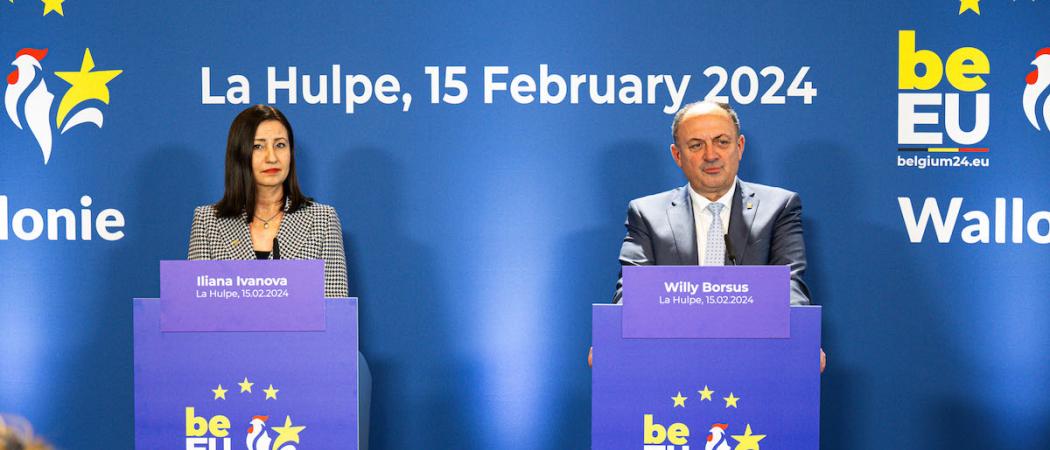At an informal meeting in Belgium, EU research ministers and research commissioner Iliana Ivanova agreed on the need to safeguard research funding, after €2.1 billion was cut from Horizon Europe

EU research commissioner Iliana Ivanova and Willy Borsus, vice-president of the Walloon government at a press conference in La Hulpe on Thursday. Photo: European Union
European research and innovation ministers and Commissioner Iliana Ivanova have affirmed a joint commitment to safeguard the budget of the next framework programme for research, in the face of growing pressure from national governments to divert EU funds towards other priorities.
Research ministers from EU member states, as well as the UK, Norway, Iceland and Switzerland, gathered in La Hulpe, Belgium, on Thursday 15 February for the first informal competitiveness council under the Belgian Presidency of the Council.
“We discussed how important it is to have a stable budget for the framework programme,” said Willy Borsus, Vice-President of the Government of Wallonia, during a press conference following the meeting.
“Research cannot be considered one of the most fundamental levers for action, deployment, and also for the future of the European Union, if the budget for the framework programme is under pressure or mishandled,” he said.
The current framework programme, Horizon Europe, had its budget cut by €2.1 billion earlier this week, as member states agreed on a revision to the EU’s long-term budget that allowed the bloc to unlock financial aid for war-torn Ukraine.
Research delegations underlined the importance of “predictability” for stakeholders to plan for future participation in the research programme, as well as the “flexibility to respond to increasingly rapid developments and emerging needs”.
Despite the ministers’ statements, the political odds are weighted against them at the moment, analysts say. The budget pressures on the EU are intense, and finance ministers are seldom sympathetic to research lobbies in the best of times. In the end, some MEPs say, the final decision will come down to the prime ministers and chancelors, rather than research or finance ministers, when budget deals get cut in top-level Council meetings in the months ahead.
Ministers were meeting to prepare for a formal Council meeting on 23 May, where they could restate their concerns about the research budget, Borsus said.
“Unfortunately, the finance ministers are not part of our meeting, but I think the results of research are the best ambassadors for the sector,” he added.
Ivanova, who was also present for the meeting, said she was pleased to have reached a deal to fund emergencies such as aid to Ukraine, but was “not happy” about the €2.1 billion cuts to Horizon Europe.
“For me this is a red flag, because we’ve been talking all day long about the strategic importance of research and innovation for European competitiveness, and the urgent need for us to invest now,” she told reporters.
Ivanova said it was “very encouraging to see a shared commitment to the [framework] programme among ministers”, and she hopes that finance ministers will also recognise the strategic importance of research.
The European Parliament and research stakeholders have launched calls to double the current EU research budget to €200 billion in 2028.
At the annual Science|Business conference earlier this week, leading MEP Christian Ehler urged research stakeholders to lobby heads of state and government for more money, as they have the power to decide budgets. “The leaders decide in the end,” he said.
It comes after the final evaluation of the 2014-2020 research programme, Horizon 2020, revealed that an additional €159 billion would have been needed to fund all high-quality proposals.
The report also highlighted the benefits of funding research. According to the Commission, every euro invested in the programme will bring around €5 of benefits to EU citizens by 2040.
The Belgian presidency of the Council will assess the Commission’s evaluation and issue its own conclusions on the performance of Horizon 2020. Borsus said the Council conclusions will feed into “preparations for the future framework programme,” Borsus said.





 A unique international forum for public research organisations and companies to connect their external engagement with strategic interests around their R&D system.
A unique international forum for public research organisations and companies to connect their external engagement with strategic interests around their R&D system.